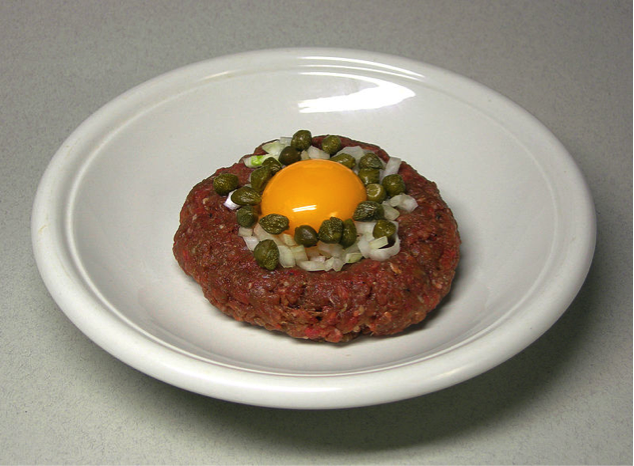by Derek Davison
Russia moved to annex Crimea this week, as Ukraine evacuated most of its soldiers from the peninsula. Tensions in eastern Ukraine seem to have reached a tense equilibrium, even as reports of a Russian military build-up along its Ukrainian border raised the possibility of another incursion.
Recent [...]]]>
by Derek Davison
Russia moved to annex Crimea this week, as Ukraine evacuated most of its soldiers from the peninsula. Tensions in eastern Ukraine seem to have reached a tense equilibrium, even as reports of a Russian military build-up along its Ukrainian border raised the possibility of another incursion.
Recent events
Moving quickly on the heels of last week’s referendum on Crimean independence, in which Crimean voters nearly unanimously voted to secede from Ukraine and become part of Russia, Russian President Vladimir Putin on Friday signed into law a bill to formally annex the peninsula. On Thursday, one day before a temporary truce between Ukrainian and Russian forces in Crimea was set to expire, the Ukrainian defense ministry announced that plans were “well underway” to evacuate and resettle the roughly 25,000 Ukrainian soldiers currently stationed in Crimea to other parts of Ukraine. Pro-Russian forces stormed the Belbek airbase near Sevastopol, wounding one Ukrainian soldier and taking the base commander prisoner. The interim Crimean government issued an order for Crimea’s Tatar population to vacate part of the land on which it is currently settled, but insisted that it will allocate other land for Tatar settlement and that Tatars will be “well represented” in the Crimean government moving forward.
The New York Times characterized the situation in the eastern part of mainland Ukraine as “an uneasy calm” between “entrenched pro-Russian and pro-Western camps that scarcely existed before [the uprisings in Kiev].” Pro-secession fervor there is at a high level, particularly in large cities that tend to have higher proportions of Russians and Russian-speakers than the surrounding countryside. Friday’s announcement that the Ukrainian government had signed an association agreement with the European Union, a deal that will bring the two parties into “closer economic and political cooperation,” raised fears that tensions in the more pro-Russian east could rise still higher.
The Organization for Security and Cooperation in Europe announced that it would deploy civilian observers to Ukraine (not including Crimea), after Russia dropped its objections to such a move. However, NATO officials continued to express concern over an alleged Russian troop buildup along its Ukrainian border, suggesting that the units could be used either to invade mainland Ukraine or to cross Ukraine and seize control of the breakaway Moldovan region of Transnistria, whose leaders requested that Russia annex it earlier this week. The Russian government claimed that any troop movements were part of routine military exercises and that there were no plans to cross the border into Ukraine. Ukraine’s acting foreign minister, Andrii Deshchytsia, told American media that the chance of a Russian-Ukrainian war was “becoming higher.”
The United States and the EU levied further sanctions against top Russian officials and allies of President Putin on Friday. The new list of American targets includes Putin’s chief of staff as well as key figures in Russia’s energy and banking sectors. The EU list includes several figures who had been named in the initial round of US sanctions on Monday. A Kremlin spokesman said that the Russian government was “bewildered” by the new sanctions and promised that it would retaliate, which it then did by placing travel bans on several American political figures, including Senators Harry Reid and John McCain and Speaker of the House John Boehner.
There are two disputed narratives that are fueling the ongoing conflict:
Was the Crimean referendum legitimate?
Although the Ukrainian government appears to have no intention of contesting Russia’s annexation of Crimea on the ground, it, along with the US and EU, has insisted that last week’s referendum is illegal under both international and Ukrainian law. Russia has argued that the referendum was consistent with international law, specifically Article 1 of the UN Charter (which mentions “respect for the principle of equal rights and self-determination of peoples” as one of the UN’s guiding principles), and Putin has specifically cited Kosovo’s secession from Serbia (which Russia opposed) as having set the precedent for this similar act by Crimea.
International law does not take a firm position on the question of self-determination versus national sovereignty. Without a clear declaration by a body like the UN Security Council there is no “law” that deals conclusively with Crimea’s decision to leave Ukraine and join Russia. Kosovo is a problematic case to use as precedent, given that its secession was the product of a war in which Serbians committed war crimes against Kosovar Albanians (though in fairness the Albanian rebels committed war crimes of their own). There is evidence of some mistreatment of Ukraine’s Russians, but a UN report (which Russia rejects) found no systematic abuses. However, the fact that the first act of the interim Ukrainian government was an aborted attempt to repeal the country’s law governing the use of official minority languages was cause for alarm among Ukrainian Russian-speakers.
Under Ukrainian law there is no question that the referendum is illegal, since Article 73 of the Ukrainian constitution requires that any changes to Ukraine’s territory be approved in an “All-Ukrainian referendum.” Last week’s Crimean vote was regional, and therefore does not meet this requirement. However, given that the Crimean and Russian governments do not recognize the authority of the interim Ukrainian government, they presumably reject its invocation of the constitution as well.
Is the Ukrainian government legitimate?
The Ukrainian government obviously thinks so, and so do the US and EU. But there is no disputing the fact that Viktor Yanukovych was the legally elected president of Ukraine before his ouster, and Russia’s official position has been that it still recognizes him as Ukraine’s rightful president, though it has not pushed for his restoration. Russia has characterized the Euromaidan protest movement that removed Yanukovych from office as an “armed fascist coup,” engineered with considerable American support. Far-right Ukrainian parties did play a large part in the protest movement, as evidenced by the sizable role that they have been given in the interim Ukrainian government. Moreover, a recording of a January phone call between Assistant US Secretary of State Victoria Nuland and US Ambassador to Ukraine Geoffrey Pyatt shows that American officials were at least discussing ways to assist the protest movement and what a post-Yanukovych government might look like. Russia also accuses the EU of having spurred the protests by forcing the Ukrainian government to choose between Russia and the EU rather than allowing it to have strong ties with both, an accusation that EU officials have denied.
On the other hand, the US supported a February 21st agreement that would have kept Yanukovych in office but restored Ukraine’s 2004 constitution (which reduced the power of the presidency relative to parliament). That deal collapsed when protesters (including the far-right elements of the movement) rejected it, despite the fact that several protest leaders had already signed off on it. Further, while the Nuland phone call is evidence that the US government supported the protesters, it is not in itself evidence of the level of that support, let alone of the idea that the US was actually behind the movement. The Obama administration contends that Yanukovych forfeited his authority when he fled the country after the February 21 agreement collapsed. Yanukovych, who also recorded a statement resigning his office, which he later retracted, was impeached and removed from office by the Ukrainian parliament. Nevertheless, there are serious questions as to the constitutionality of that impeachment vote and the manner in which Yanukovych’s successor was determined.
Photo: Crowds waving Crimean and Russian flags in Simferopol in Crimea after the referendum. Credit: Alexey Yakushechkin/IPS
]]>by Derek Davison
Let’s talk about the difference between a “Tatar” and “tartar.” Yes, I’m talking to you, National Geographic:
Russian forces are also conveniently located in Crimea, where a largely Russian populace (59 percent; Crimea was a part of Russia until 1954)—has so far welcomed the Russian forces. Twelve percent [...]]]>
by Derek Davison
Let’s talk about the difference between a “Tatar” and “tartar.” Yes, I’m talking to you, National Geographic:
Russian forces are also conveniently located in Crimea, where a largely Russian populace (59 percent; Crimea was a part of Russia until 1954)—has so far welcomed the Russian forces. Twelve percent of Crimea’s population, however, is made up Crimean Tartars, who once ruled the peninsula.
I’m also talking to you, Journal of Turkish Weekly (the piece is even called “Crimean Tatars: May 25 referendum unacceptable”!):
Crimean Tartars, who make up 13 percent of the Crimea population, are also against a decision voted on by the Parliament on Thursday, to hold a referendum on May 25 to decide the future of Crimea’s status.
Eli Lake, you’re not off the hook either:
Zissels said he was more worried for the Muslim majority Tartar community in Crimea than he was for the 17,000 Jews who are estimated to live there.
Also, Michael Collins Dunn at the Middle East Institute (!), you too:
Most of the reporting of the crisis in the Crimea has focused on ethnic Russians battling ethnic Ukrainians, but there is another ethnicity that ruled Crimea before either country: The Crimean Tartars.
See, the Tatars are the people who live in Crimea (and elsewhere; the largest subset is actually the Volga Tatars, who live in the Ural Mountains). When the Mongols swept across Asia and into Europe in the 13th century, several of the tribes in their confederation had the name Tatar, and when the Europeans heard the word “Tatar,” to their ears it sounded an awful lot like “Tartar.” The Latin word for Hell is Tartarus, and those Mongol armies might have seemed like they were sent from Hell to overrun Christian Europe, so the corrupted name “Tartar” stuck. Nowadays we know that the people call themselves “Tatars,” but some of us keep calling them “Tartars” anyway.
Let’s run through some pictures that might help get my point across. These are Crimean Tatars:

This, on the other hand, is tartar, right before the dentist scrapes it off:

Here’s steak tartare:

Culinary lore says that this dish was named after the Tatars, or “Tartars.” Europeans observed that Mongol horsemen would slip thin cuts of meat under their saddles and assumed that the rider would then eat the meat after it had been tenderized by a hard day of riding. Turns out the slices of meat were put under the saddle to soothe sores on the horse’s back and were thrown away, not eaten. Really, if you think about it, who’s going to eat a slice of meat that’s been stuck under a horse’s saddle all day?
Actually, steak à la tartare gets its name not from the Tatars, but from the sauce that usually accompanies it: tartar sauce, seen more often nowadays with fried fish and chips than with raw meat:

Tartar sauce may be named after the Tatars, but as far as I can tell it’s not clear how or why that would be.
These are taters, and now we’re completely off topic, although they are indispensable for making fish and chips with tartar sauce:

I’m obviously making light of a silly linguistic error, but the situation in which the Crimean Tatars find themselves right now is anything but silly. In 1944 Josef Stalin ordered the mass deportation of all Crimean Tatars on the charge, later shown to be false, that large numbers of Tatars had collaborated with Nazi forces when the Nazis occupied Crimea from 1941-44. Between the conditions of the deportation itself and the poor conditions that awaited the Tatar exiles in their new “homes” in Central Asia, it’s believed that 109,956 Crimean Tatars, or 46.2% of the 238,500 deportees, died within 18 months. Perhaps it’s understandable, then, why the prospect of a Russian annexation of Crimea does not make the peninsula’s Tatars, who were only allowed to return to their ancestral homeland in the 1980s, particularly excited.
So please, let’s at least resolve to refer to them as the Crimean Tatars and not by a 13th century corruption of that name that suggests they were either sent from Hell or caused by poor dental hygiene. Once we have the name right, maybe then we can consider what may happen if their community is absorbed into Russia against their will.
]]>This is the second in a series of primers on the fast-moving situation in Ukraine, and covers events from March 2 through March 9. For more background on the situation, please see part 1.
Summary of Recent Events
This week saw sporadic military activity on the Crimean peninsula, in [...]]]>
This is the second in a series of primers on the fast-moving situation in Ukraine, and covers events from March 2 through March 9. For more background on the situation, please see part 1.
Summary of Recent Events
This week saw sporadic military activity on the Crimean peninsula, in particular a reported attack by pro-Russian gunmen on a Ukrainian air force base in Sevastopol that ended when the gunmen retreated. Diplomatic efforts seem to have stalled, as Russia refused to speak directly with the new Ukrainian government, which it regards as illegitimate, and threatened that any sanctions against Russia would “boomerang” against the United States. The week’s biggest development was that Crimea’s parliament has voted to begin the process of seceding from Ukraine and joining Russia, a vote that the governments of Ukraine, the United States, and the European Union all termed “illegal.”
Secession movement
On March 6 the Crimean parliament voted to secede from Ukraine and become part of Russia, pending the approval of the Russian government and the results of a referendum now scheduled for March 16. Although Russian President Vladimir Putin had said earlier in the week that he “did not foresee” Russia annexing Crimea, the leaders of both houses of Russia’s parliament publicly welcomed the Crimean assembly’s vote and pledged to honor the wishes of the Crimean people as expressed in the referendum. The draft referendum, which Kyiv Post revealed, offers two options: “joining Crimea with the Russian Federation” or “restoration of 1992 Crimean Constitution” (which declared Crimean independence, then was amended to declare its autonomy within Ukraine).
Ukraine’s interim Prime Minister Arseniy Yatsenyuk criticized the Crimean vote as “illegitimate,” and its interim President, Oleksandr V. Turchynov, termed the vote “a farce.” Leaders of Crimea’s sizable Tatar minority also expressed opposition to the vote. Their sentiments were echoed by American and European leaders. US President Barack Obama characterized the vote as illegal under both the Ukrainian constitution and international law, and the EU envoy to Ukraine, Jan Tombinski, argued that a referendum on secession that was restricted to Crimea would violate Ukrainian law.
Attack on Ukrainian base, questions about the Russian forces
On Monday Ukrainian military sources reported that the commander of Russia’s Black Sea Fleet, based in Sevastopol, had given Ukrainian forces in Crimea until early Tuesday morning to surrender or face an attack. Russian officials denied that any such ultimatum had been issued, and the deadline passed without incident. On Friday, however, armed pro-Russian forces stormed a Ukrainian air force base in Sevastopol and occupied parts of it for several hours as they demanded the surrender of the Ukrainian soldiers inside. When the Ukrainian soldiers refused to surrender, the gunmen withdrew; thus far, both Ukrainian and Russian forces have not fired on one another. Russia continued to deny that the pro-Russian forces in Crimea were Russian military, insisting that they are local “self-defense units,” but considerable evidence has been found suggesting that they are, in fact, Russian military forces. The Ukrainian border guard service contended that roughly 30,000 Russian troops are now on the peninsula, and photographs allegedly taken near the southern Ukrainian city of Chonhar appear to show a freshly dug minefield along the approach from the Ukrainian mainland to Crimea. Deputy Crimean Prime Minister Rustam Temirgaliev stated that Russian troops are the only legal soldiers in Crimea, suggesting that Ukrainian soldiers still on their bases are considered illegal by the Crimean government. On Saturday, March 8, a bus carrying international observers from the Organisation for Security and Co-operation in Europe (OSCE) attempted to enter Crimea, but it turned back at the northern Crimean city of Armyansk when “warning shots” were fired at it.
Diplomacy sputters amid looming threat of sanctions from both sides
President Vladimir Putin gave a press conference on Tuesday that appeared to “hit pause” on the Crimea situation, though this characterization was obviously premature given events later in the week. Putin described the events that forced Ukrainian President Viktor Yanukovych from office as “an anti-constitutional coup” and claimed that Russian intervention was necessary to safeguard the ethnic Russians who are concentrated in Crimea and in major cities in the eastern part of Ukraine, though he reiterated the official Russian position that there has not been an invasion. US Secretary of State John Kerry traveled to Kiev to offer the interim government $1 billion in loan guarantees, and while there he, in remarks that were echoed by Obama, accused Putin of “hiding behind falsehoods” to justify Russia’s actions, and called on him to return Russian forces to their barracks. Kerry failed in his efforts to arrange a meeting between Russian Foreign Minister Sergei Lavrov and his Ukrainian counterpart, with Lavrov refusing to recognize the legitimacy of the Kiev government, but on Saturday one of Russia’s deputy foreign ministers did meet with the Ukrainian ambassador to Russia in Moscow.
Sanctions both by and against Russia were already being imposed by week’s end. On Thursday, President Obama ordered the imposition of sanctions against “individuals and entities” that were involved in Russia’s move into Crimea, which followed an earlier decision to suspend all US military cooperation with Russia. European Union leaders suspended talks with Russia on economic and travel issues but did not yet appear to be prepared to go any further. European leaders expressed concern that a Russian response could damage economies across Europe, and Lavrov warned that sanctions could “boomerang” against the United States and Europe. Russia announced that it was considering pulling out of arms control treaties with the US and the OSCE in response to American actions. More urgently, the Russian firm Gazprom hinted Friday that it may suspend gas shipments to Ukraine (and thus, potentially, through Ukraine and on to the rest of Europe) due to Kiev’s outstanding debt, which Gazprom estimates to be $1.89 billion.
Questions over legitimacy
Earlier this week Obama stressed that “[a]ny discussion about the future of Ukraine must include the legitimate government of Ukraine,” but the standoff is being driven in part by a disagreement over what the “legitimate” government of Ukraine actually is. Russia still recognizes Viktor Yanukovych as the legitimate president of Ukraine, and claims that Yanukovych asked for Russian military assistance when he was ousted. The United States, on the other hand, has recognized the interim government in Kiev and says that Yanukovych’s actions in office “undermined” his claim to authority despite the fact that he was a democratically-elected leader. Russia’s continued refusal to deal directly with Kiev is couched in terms of the new government’s illegitimacy, at least in Russia’s view. Aid from the United States and from Europe is being offered to help stabilize the government in Kiev.
]]>by Mark N. Katz
Now that Russian forces have taken Crimea away from Ukraine, what will President Vladimir Putin do next?
There’s one thing he clearly will not do, and that’s give Crimea back to Kiev, as Ukrainian and Western governments have been calling for. Just as Moscow has backed “independent” [...]]]>
by Mark N. Katz
Now that Russian forces have taken Crimea away from Ukraine, what will President Vladimir Putin do next?
There’s one thing he clearly will not do, and that’s give Crimea back to Kiev, as Ukrainian and Western governments have been calling for. Just as Moscow has backed “independent” pro-Russian governments in Abkhazia and South Ossetia ever since Russian forces seized control of them from Georgia in 2008, Moscow undoubtedly intends to maintain the “new order” in Crimea indefinitely.
What exactly will that new order look like? If indeed the Crimean parliament’s plan for a referendum on whether the region should “join Russia” is held on March 16, it will undoubtedly pass. While the Ukrainian and Tatar populations oppose this, the Russian majority in Crimea has long wanted to leave Ukraine and “rejoin” Russia.
(At some point after the Bolshevik Revolution, Crimea was assigned to the Russian Federation, but in 1954 Khrushchev transferred it to Ukraine. This did not matter much as long as the Soviet Union held together, but after it broke up in 1991, Russian nationalists both in Crimea and in Russia itself have been calling for the “return” of Crimea to Russia.)
If this referendum is held and yields the expected result of an overwhelming vote in favor of Crimea joining Russia, it is not clear whether Putin will proceed to incorporate it into Russia, recognize it as independent (like he did in Abkhazia and South Ossetia), or allow it to remain in limbo. Choosing the last of these options would allow hope to remain alive in Ukraine and the West that Crimea will someday return to Kiev’s control — even if Putin has no intention of allowing this. Recognizing Crimea as independent would anger Ukraine and the West, but would still allow them to hope. Incorporating Crimea into Russia, though, would signal that Moscow has no intention of allowing Crimea to return to Ukraine either now or ever.
It might seem that absorbing Crimea into Russia would not be a good choice for Moscow due to the negative effect this would have on Russian relations both with Ukraine and the West. From Putin’s point of view, though, this might actually be the most desirable course of action. Since the “color revolutions” in Georgia, Ukraine, and Kyrgyzstan of the mid-2000s, the widespread anti-Putin demonstrations in Russia itself in late 2011/early 2012, and the recent events in Ukraine that led to the downfall of a pro-Russian government and the rise of a pro-Western one there, Putin has been fearful about the growing democratic movement in Russia that could become strong enough to topple him.
But given that incorporating Crimea into Russia would undoubtedly be popular with much of the Russian public, Western insistence that Russia give Crimea back to Ukraine might actually serve to alienate the Russian public from the West and (Putin hopes) democracy.
Russia could also now choose to absorb other parts of Ukraine where there are large Russian populations. While both Ukraine and the West would howl in protest, Western inaction at Putin’s successful wresting of control of Abkhazia and South Ossetia from Georgia in 2008 and Crimea from Ukraine recently might well lead him to conclude that he can do this again with little cost.
And he might be right. However, in Abkhazia, South Ossetia, and Crimea Putin benefited from the fact that much of the local populations welcomed his actions. There are places in eastern Ukraine where this would also be true, but there is also a significant Ukrainian population that would oppose such a move. The danger Putin faces is that he might overestimate the local demand for absorption into the Russian sphere of influence and underestimate local opposition to it. The more of Ukraine he decides to “liberate,” the greater the risk that he will encounter this problem. Furthermore, local opposition in Ukraine to absorption by Russia, whether it is violent or peaceful, would not only serve to delegitimize this Russian effort in Ukraine and the West, but could lead to more opposition to his rule inside Russia.
Putin’s success so far in Crimea certainly gave rise to the appearance that he now has additional options to expand Russian influence in Ukraine, and perhaps elsewhere. But a decision to exercise those options in the near term may actually serve to limit his options in the long term.
]]>